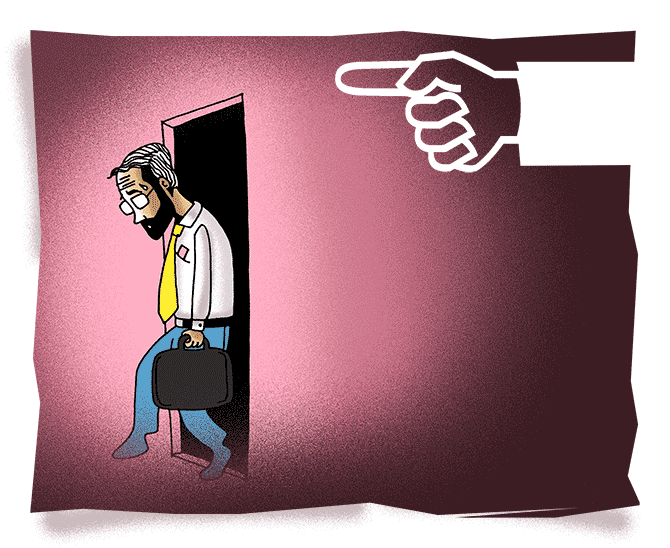Assume the worst regarding how long your unemployment could last and make conserving cash your topmost priority, suggests Sanjay Kumar Singh.
Illustration: Dominic Xavier/Rediff.com

Vishesh Prasad (name changed on request), 42, who works in Mumbai for a real estate consultancy as a content writer and communications personnel, was recently informed by his boss that he would have to relocate to Delhi, failing which his contract would not be renewed.
"My company is on a cost-cutting spree. It has used the oldest trick in the book to get me to quit, knowing fully well that I cannot leave my aged parents behind and relocate," says a disgruntled Prasad.
With only three months left before his contract ends, he is frantically searching for a job.
As the economy slows and companies try to pare costs, thousands across the country are finding themselves in a similar predicament.
"Automobile, textile, infrastructure and telecom are sectors that have been hit particularly hard by layoffs, though the sentiment runs across others as well," says Prabir Jha, founder and chief executive officer, Prabir Jha People Advisory.
Around 46 per cent of Indian respondents in a recent Ipsos survey pointed to joblessness as their main worry.
Experts say getting laid off is not such a rarity in the private sector anymore.
"During a career spanning, say, 35 years, you could face at least five episodes of economic slowdown and could get laid off during any one of them. The risk increases with age and salary," says Avinash Luthria, a Sebi-registered investment adviser and founder, Fiduciaries.
Instead of feeling stigmatised, prepare yourself financially for such an eventuality.
~ Before a potential layoff
Build your contingency fund: As soon as you detect straws in the wind -- peers receiving the pink slip, projects getting shelved, etc -- start preparing for the worst.
Any financial cushion you have will be your only safeguard.
"A candidate with higher financial sustainability can take more time to find the right job," says Rituparna Chakraborty, co-founder and executive vice president, TeamLease Services.
A family with a single earning member should have at least 12 months' worth of expenses as contingency fund while six-nine months of expenses may be adequate for a double-income family.
Purchase adequate health insurance
If the only cover you have is the one provided by your employer, get a personal cover for your family.
A family floater of Rs 5-15 lakh should suffice for most nuclear families.
Those in the twenties and thirties may have parents who can still be insured.
"Buy a cover for them. If they are dependent on you, your finances could be hit if they have a medical issue," says Vishal Dhawan, chief financial planner, Plan Ahead Wealth Advisors.
Avoid illiquid instruments
Do not tie up the bulk of your investment in products from which it is impossible to withdraw money when needed.
"Structured products, fractional property investments, and even insurance-cum-investment should be avoided for this reason," says Luthria.
The only exceptions to the rule of not investing in illiquid instruments are Public Provident Fund (PPF) and National Pension System (NPS).
~ After receiving the pink slip
Maximise liquidity
Assume the worst regarding how long your unemployment could last and make conserving cash your topmost priority.
SIPs may have to be stopped (depending on your cash position).
You may receive EPF money from your employer.
"Fresh capital should only be invested in instruments where the principal will not be eroded," says Ankur Maheshwari, chief executive officer, Equirus Wealth Management.
Return to investing according to your normal asset allocation once you have found another job.
Luthria suggests keeping any money received in safe and liquid instruments like savings deposit and fixed deposits of quality scheduled commercial banks.
"Avoid taking any risk with this money, such as parking it in a co-operative bank or even a small finance bank," he adds.
Since debt funds can see capital erosion, it is better to avoid them.
Many people think of starting a business with their PF money.
"This decision should depend on the robustness of your business plan, not merely because some capital has become available," says Dhawan.
Tighten your belt
Discretionary expenses like vacations, home and car upgrades, etc may have to be deferred.
Scope may exist to reduce some of your fixed expenses as well.
For instance, you may have rented a house in an expensive locality because of its proximity to your workplace.
But now that you don't hold the job, you could consider moving to a less expensive locality.
Prepay loans?
Repay credit card and other high-cost loans using up to 10-15 per cent of your corpus.
However, do not rush to pay off lower-cost loans like home loans.
Your most crucial goal at this juncture should be to maintain your liquidity cushion.
If it shrinks, you will not have much choice and will be forced into accepting the first job that comes along.
- Have you coped with a layoff? SHARE your advice on the message board below.












 © 2025
© 2025